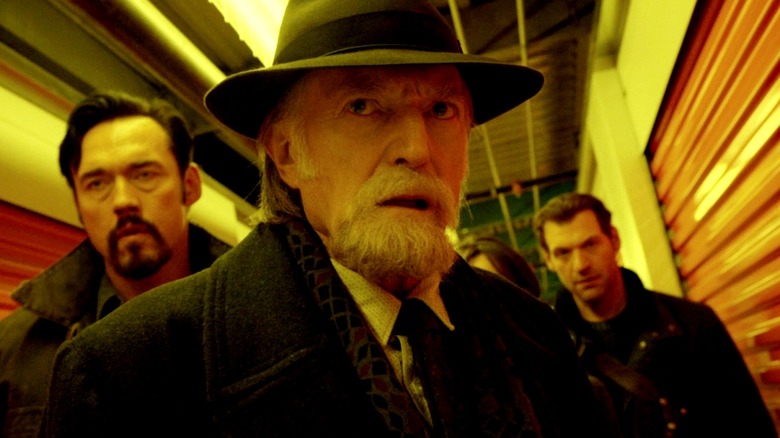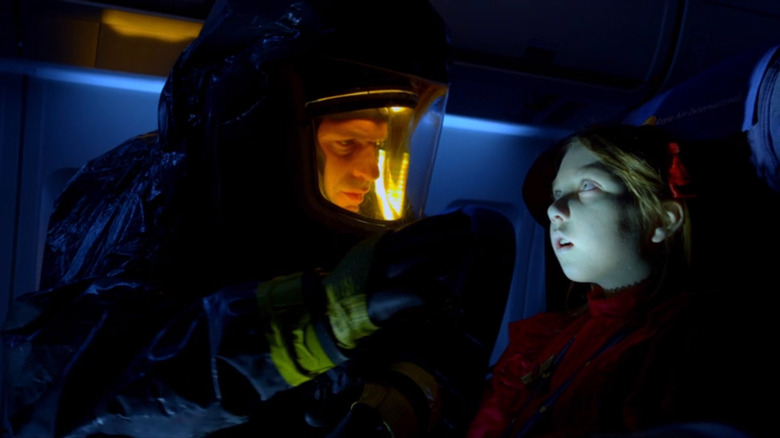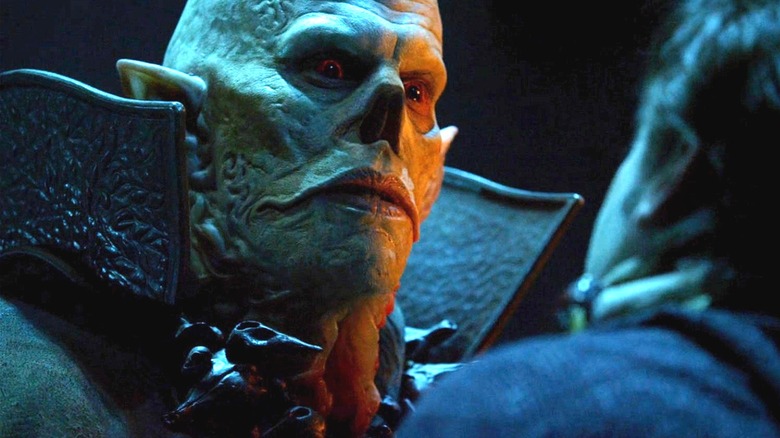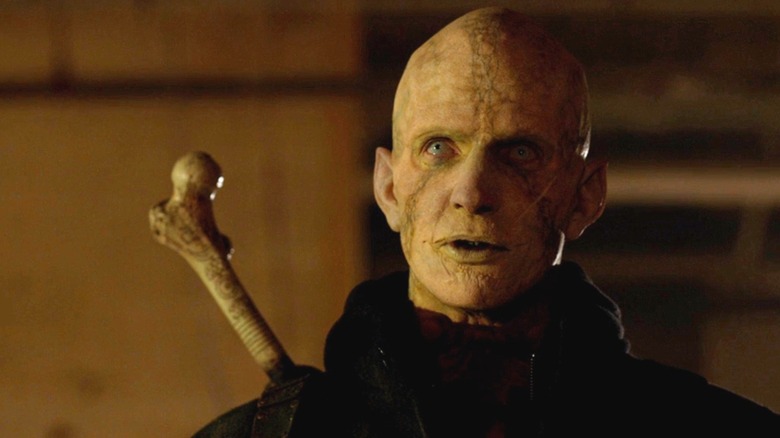Forget The Walking Dead, Give The Strain A Horror Film Trilogy For The Big Screen
In 2014, Walkers took over the world. AMC's primetime series "The Walking Dead" was averaging 14.38 million viewers an episode with no sign of stopping. At this rate, it looked like someone would need to take a baseball bat to Rick Grimes' (Andrew Lincoln) story to slow things down. But while Walkers were getting shot with crossbow bolts or sliced up with samurai swords, another series was delivering a different kind of terror and doing an impressive job of it, too. Skulking in the shadows, its stinger exposed, FX's equally gross but immensely underrated vampire show "The Strain" was trying to get in on the TV horror action but never quite managed to overtake AMC's moaning, groaning army of the undead.
Spanning just four seasons, the show about a vampire infection taking over the world got in and out like a creature in the night, stumbling slightly at the penultimate hurdle before going out on a massive high with its final season earning 100% on Rotten Tomatoes. In hindsight, this underdog show featuring a different kind of undead menace deserved all the praise it received, daring to display an even bigger scope in a world that felt sturdier than even the one that's home to Negan and Michonne.
It was also way ahead of the curve in the anxieties and horrors it harbored. This was understandable, really, because the book it came from was penned by two authors known for having huge visions, which is precisely why now is as good a time as any to revisit their nocturnal nightmare. Not only because it's the type of epic vampire story that we've been massively lacking in recent years, but it could be the last filmic hurrah for the director partly responsible for it: Guillermo Del Toro.
The Strain was a good TV show spawned from a great book with blockbuster potential
Originally published in 2009, "The Strain" was the first part of a trilogy of novels co-written with Chuck Hogan (author of "Prince of Thieves," from which "The Town" was adapted) and Guillermo Del Toro, and the visionary director behind movies like "Pan's Labyrinth" and "Chronos" left his calling card wedged between every page. Packing the firepower of "Blade II" and existing in the same neighborhood as "Salem's Lot" and "Dracula," the story begins with a Boeing 777 plane landing at JFK Airport before going totally dark. After an inspection by CDC head Ephraim Goodweather (played in the show by Corey Stoll), it's determined that something has managed to kill every passenger on board save for three and the pilot. So begins a brilliant mish-mash of gothic and body horror as an ancient evil spreads through New York City, bringing with it a vampiric horde and a rivalry that stretches all the way back to World War II and beyond.
While the series certainly did a good job of bringing "The Strain" to the small screen, something about the story felt so much bigger than what the show gave us. It was hindered by ropey special effects (The Master in the first season? Oof!) and iffy performances. Characters and plot threads that were written especially for the show added filler to a story that didn't need it. There was no fat on this bloody blockbuster saga to begin with, and it's a tale that, if Del Toro fancies another go at it, would fit perfectly on the director's list of final live-action films.
The Strain Trilogy could be among the last live-action films that Guillermo Del Toro could make
Following the release of his take on "Pinocchio," Guillermo Del Toro revealed that going forward, animation will be his only main focus. Speaking at the Annecy festival, Del Toro revealed, "There are a couple more live-action movies I want to do, but not many." It sounds slightly like a Tarantino-esque countdown to his final film, while there's been no confirmation of just what or when we'll be getting Del Toro's next live-action project, "The Strain," regardless of how long since it's been on television, is worthy of revisiting by the Oscar-winning filmmaker.
The three-part feature film battle between humanity and the strigoi (vampires) would be a rewarding romp not just for fans but for the man who has earned such a trilogy. Unlike his highly praised iteration of "Hellboy," which he was never able to conclude, or "The Hobbit," which he left to Peter Jackson, "The Strain" would be a big-screen trilogy Del Toro would actually get to finish. A massive, macabre story that would not only be an easy venture for him to revive and repurpose for theaters but would also tap into a monster that had been used for more funnies than frights lately. Thanks to projects like "Renfield" and "What We Do In the Shadows" (which is now in its fifth season), vampires aren't what they used to be, and the only recent effort trying to rekindle that has been the box office failure "The Last Voyage of the Demeter." A second chance with "The Strain" could remind audiences that vampires can be really scary villains when handled correctly, and even more so when backed by a horror that would strike harder following recent real-world events.
The Strain was ahead of the curve with its monster origins, but a movie could remedy some issues
Unlike "The Walking Dead," which began its story after the outbreak had taken root, "The Strain" dared to drop us in at the same time as its virus arrived and, in doing so, tackled topics that would become hugely relevant in the years to come. Besides batting against the undead, CDC specialist Eph and his team tried desperately to figure out and inform the world of a virus that would put everything at a standstill. Foreshadowing elements that would become not only prominent in reality but also one of the biggest fear factors that helped bring "The Last of Us" to life, it stands to reason that a new version of "The Strain" could amplify relatable scenarios that the world has now endured but weren't dealt with too well in their television format.
Besides some annoying characters outstaying their welcome, the one inconsistency with the show was the virus outbreak and how anyone outside of its core characters was clueless as to what was going on. This disease involved undead individuals feasting on human blood and spreading the sickness as far as possible, and yet New York City carried on regardless. If a movie trilogy did come to pass, it could turn up the dial on a shared fear that has already been tapped into by HBO's hit video game adaptation, but with more of an intense and lengthy bite. By keeping things present and on the pulse, it could give time for other plot threads to get their own time in the sun by way of spin-offs and franchise potential — potential that "The Strain" is riddled with.
The Strain doesn't just have to be a trilogy, it's a franchise waiting to be torn wide open
As compelling as Eph's efforts to bring down a thousand-year-old evil are, the story's real draw is weathered warrior Abraham Setrakian (played by David Bradley in the show), whose battle with darkness had spanned decades. A modern-day Van Helsing, Bradley's bitter, silver-obsessed vampire hunter was one of the show's highlights, and his backstory made for the most intriguing part of the story. But flashbacks aren't enough for the character and his history — it and so many other areas of "The Strain" deserve their own movies as well.
Expanding on an existing IP isn't anything new, and there's so much in the book trilogy that could be explored in spin-offs or prequel films. This world contains a nightmare that stretches back thousands of years, with characters who lived through it that are all worth exploring. Want to see vampires in WWII? "The Strain" show touched on that, but nowhere near enough. Want to see vampires fight in gladiatorial battles? There's some of that, too. These are some of the nuggets of info just begging to be told that could be dropped throughout a Del Toro trilogy for someone else to pick up in future prequels or side stories.
Ultimately, much like the vampires at the heart of "The Strain," this story is worth a second chance. With the gap between shows or films and their spin-offs or remakes being shorter than ever before (how many "Walking Dead" shows do we have now?), it's a better time than any to let Setrakian's silver sing and bring "The Strain" back in a big and bloody new way.




